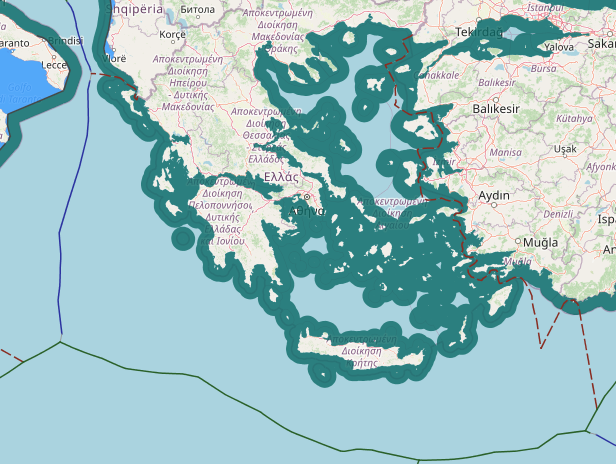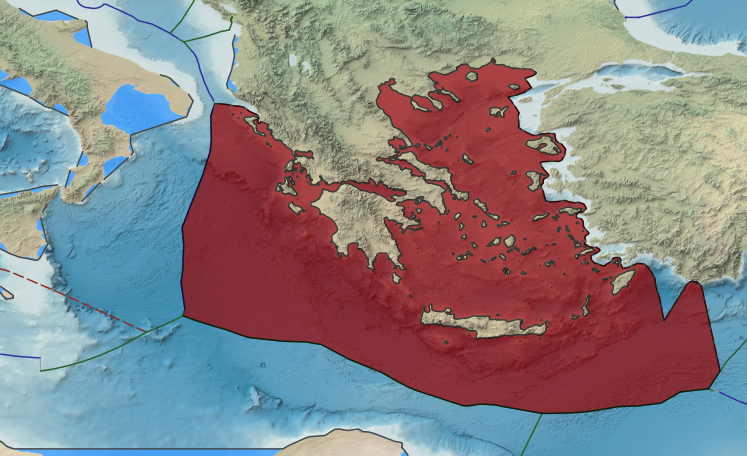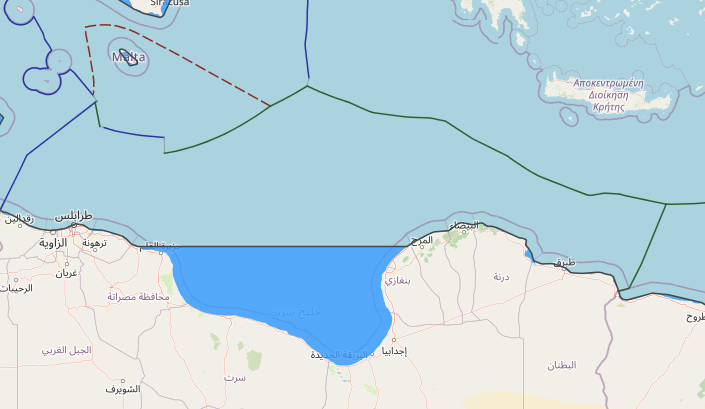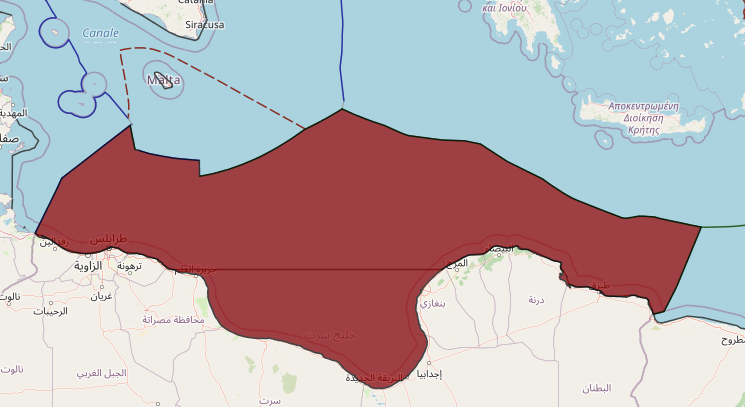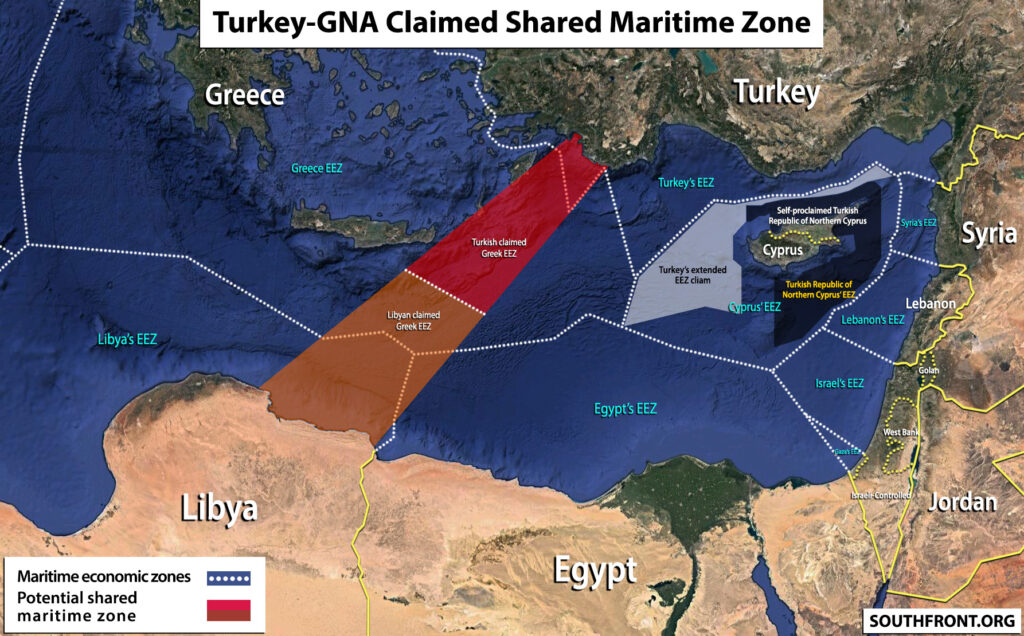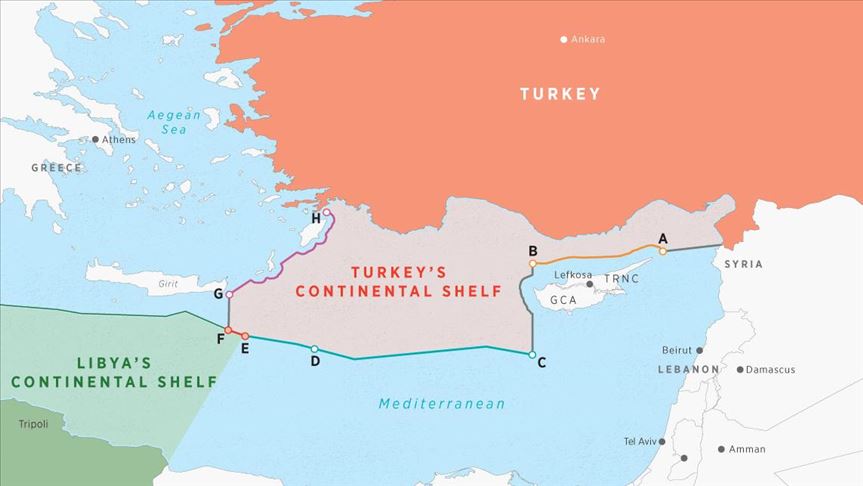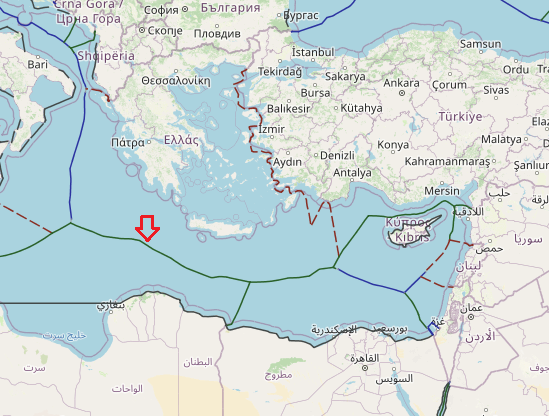Till now Greece and Libya hasn’t achieve to any agreement about maritime boundaries and all the maritime border between them based on their unilateral statements. some disputed situation raise from this point that Greece and turkey has many challenge about their maritime zone. for example Greece take EEZ for own island in eastern Mediterranean sea, but turkey has opposite idea. for this reason they have unsettled issue on the Mediterranean zone.
Greece responded with anger over the joint Turkish-Libyan agreement to discuss a new delineation of Turkey’s maritime borders which includes waters off the Greek island of Crete. According to Turkish President Recep Tayyip Erdogan, his country’s sovereign waters extend eastward from Libya and include a portion of waters off Crete, as the newly-drawn map Ankara has issued shows. However, the map was not sent to the United Nations.
The move is a blatant violation of the United Nations Convention on the Law of the Sea (UNCLOS), since the two countries do not share maritime boundaries. In essence, the agreement between them has no legal validity whatsoever.
The map is presented on Turkish media shows maritime borders as — its government says– “they should be.” One Turkish news website also posted the map in a report with the provocative title, “Historic Turkey-Libya agreement to put an end to Greek occupation of East Med.”
about greece claim for this area, their governments to UN stated that:
“These actions include the attempt to usurp sovereign rights of coastal States by claiming that islands are not entitled to an exclusive economic zone and a continental shelf, the issuing of unauthorized navigational warnings and the announcement of exploration activities on other countries’ continental shelves.
It is to be noted that the aforementioned step by Turkey was taken despite the protocol agreed upon by the foreign policy advisers to the leaders of Greece and Turkey about the restart of the exploratory talks on the delimitation of the continental shelf and the exclusive economic zone between the two countries and only a few days after the meeting between the Ministers for Foreign Affairs of Greece and Turkey in Bratislava, followed by official statements by the Turkish side that it would propose dates for the resumption of these talks. It is also to be recalled that the restart of the Greek-Turkish exploratory talks had been agreed upon after short-lived de-escalation moves taken by Turkey, following an unprecedented culmination of tensions between the two countries owing to Turkey’s illegal acts, marked also by the presence of the two respective fleets facing each other in the Aegean and the Eastern Mediterranean.
The new Turkish NAVTEX message demonstrates clearly that Turkey, contrary to its relevant statements, stands deplorably against any kind of dialogue.
The dispatch anew of a Turkish research/survey vessel with the aim of conducting seismic activities in an area falling within the Greek continental shelf constitutes in itself a clear violation of Greece’s sovereign rights over its continental shelf, as enshrined in article 77 of the United Nations Convention on the Law of the Sea, which reflects customary international law. It also constitutes a blatant violation of article 121 (2) of the Convention, according to which islands generate maritime zones (continental shelf/exclusive economic zone) beyond their territorial sea, as any other land territory.
Since Greece has ab initio and ipso facto sovereign rights over its continental shelf, including the exploration and exploitation of its natural resources, the above activities by Turkey neither have any legal consequences whatsoever for Greece’s sovereign rights nor prejudice those rights in any way.
In this respect, I recall our note verbale dated 8 May 2012, by means of which the Greek national legislation defining the outer limits of the Greek continental shelf was registered with the United Nations (see Law of the Sea Bulletin, vol. 79, p. 14).
Turkey constantly violates international law, including the law of the sea, and the principles of good neighbourly relations, ignoring calls from the international community to take steps in the opposite direction. Turkey’s actions are in striking contrast to the efforts of Greece and other neighbouring countries to preserve peace and stability in the region. My country remains committed to these efforts, while, at the same time, safeguarding its sovereign rights. In this respect, Greece stands ready, as ever, to engage in a meaningful dialogue with Turkey based on the rules of international law and the principles of good neighbourliness, but certainly not in an aggressive environment or under threats of the use of force.”
encounter, Turkish government said:
“Consequent to her deployment in the Eastern Mediterranean, the seismic research vessel Oruç Reis returned to the port of Antalya on 12 September 2020 for routine maintenance and resupply operations. As of 12 October 2020, Turkey has been proceeding with seismic survey activities within its own continental shelf in the Eastern Mediterranean, the outer limits of which have been established in accordance with international law and principles, and are consistent with the relevant decisions of international courts as well as State practice in maritime boundary delimitation. In this regard, with reference to my letters dated 21 August 2020 (A/74/997-S/2020/826), 18 March 2020 (A/74/757) and 13 November 2019 (A/74/550) elaborating the details of these principles, the seismic research activities of Oruç Reis announced with a NAVTEX message (1262/20) within the Turkish continental shelf do not constitute a violation of the sovereignty of any State.
In this context, I deem it necessary to reiterate that Greece’s recurring objections to Turkey’s exercise of its sovereign rights within its own continental shelf, based merely on the claim that the island of Kastellorizo generates full effect in maritime boundary delimitation, are devoid of any legal basis. Considering the dominating geographical circumstances in the relevant area, namely the overwhelming length of the Turkish coastline and the seaward projection thereof, the island of Kastellorizo could not be accorded maritime jurisdiction areas beyond territorial waters in accordance with the jurisprudence of international courts as well as the State practice in that respect.
Greece’s selective interpretation of the law of the sea concerning the role of the islands in the delimitation of the continental shelf/exclusive economic zone and simultaneous neglect of the principle of equity as the fundamental rule of maritime boundary delimitation are indicative of Greece’s insistence to maintain maximalist and excessive maritime boundary claims, ignoring the legitimate rights of Turkey.
Regardless of the current state of affairs in the Eastern Mediterranean as outlined above, Turkey honours all its commitments reached at bilateral and multilateral forums and is ready to engage in a dialogue without any preconditions at the earliest convenience. In the meantime, Turkey will carry on exercising its sovereign rights over its maritime jurisdiction areas while maintaining its resolve for a sincere and meaningful dialogue with Greece towards a peaceful and lasting solution based on equity for all outstanding issues between the two countries.
On this occasion, I would also like to refer to my letter dated 2 July 2020 (A/74/936) once more, in which I have clarified that, even if registered with or published by the United Nations, neither the unilaterally characterized domestic laws or practices of other countries nor the bilateral agreements that Turkey has explicitly objected to between third countries concerning the delimitation of maritime jurisdiction areas are binding upon or can be invoked against Turkey in relevant dealings.”
